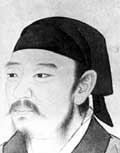| About China > History > Celebrities |
|
|
Xunzi
Xunzi, also named Xun Kuang, was born in the State of Zhao in the Warring States Period (475-221BC). He traveled from his native Zhao to the state of Qi when only fifteen to pursue his studies. Soon he became a well-recognized scholar and rose to official posts, including that of magistrate.
In spite of his gloomy view of humanity's original nature, Xunzi saw people as perfectible through education and through application of the proper rules of conduct. People were born with a conflicting mixture of desires that if allowed unfettered reign would lead to disaster. It was the role of society, through its culture (including music) to impose order onto the chaos of desires and channel them into constructive, rather than destructive, effort. He held that human intelligence created social organizations in order to bring divergent human impulses into harmony. To this end, Xunzi stressed not only the importance of education but also the correct use of words, often providing extensive lists of definitions. He is also noteworthy in his view that heaven is not the realm of mystical forces embodying ethical principles (Mencius' view) but is part of the realm of nature, indifferent to humans.
Xunzi developed his theories in a logical manner in his master piece Xunzi of some 32 chapters. These might be regarded as the first collection of philosophical essays in China -- as distinct from fragments (analects) or records of conversations.
http://www.miami.edu/phi/bio/Buddha/xunbio.htm
|
||||
 |
